USF professor set to reemerge after living 100 days underwater conducting record-breaking research
KEY LARGO, Fla. - Near the tip of the Florida Keys, a short swim from the dock at the Jules Undersea Lodge in Key Largo, sits a submerged habitat: An undersea classroom, bubbling with promise.
It's where retired Navy commander and University of South Florida Professor Dr. Joe Dituri spends his days and nights monitoring his body changes under sustained pressure close to 30 feet below the surface.

Dr. Joe Dituri, is a retired Navy Commander and a USF professor.
"I've already shrunk at least a half an inch [due to the pressure]," Dituri told FOX 13.
Dr. Dituri has hosted guest scientists and STEM students in the habitat, but FOX 13's Mark Wilson was the only reporter to dive down to interview him inside.
Watch the extended interview during Anchor Mark Wilson's trip below the surface:
FOX 13's Mark Wilson's extended interview with Dr. Deep Sea
Near the tip of the Florida Keys, a short swim from the dock at the Jules Undersea Lodge in Key Largo, sits a submerged habitat: An undersea classroom, bubbling with promise. FOX 13's Mark Wilson talks with retired Navy commander and USF professor, Dr. Joe Dituri, who spends his days and nights monitoring his body changes under sustained pressure close to 30 feet below the surface.
"I got certified as quickly as possible once you agreed to have me join you, so thanks for the invite. It's definitely the most unique interview I've done," Wilson told Dituri, who also goes by the nickname "Dr. Deep Sea."
He didn't have to measure himself, because the habitat is so small. When Dituri moved in on March 1 with his 6'1" frame, he often banged his head on an iron handle on the ceiling.
Previous: Here's the underwater Florida hotel where a USF professor will spend 100 days
A University of South Florida researcher is going away for 100 days to study how his body is impacted by "extreme pressure." In this video, Joseph Dituri gives a tour of his living space -- which is an underwater hotel in the Florida Keys.
He's a half inch beneath it now just a week before he emerges. So does he expect to regain that lost height?
"I don't know. No idea. That's why we're doing this," he said with a smile.
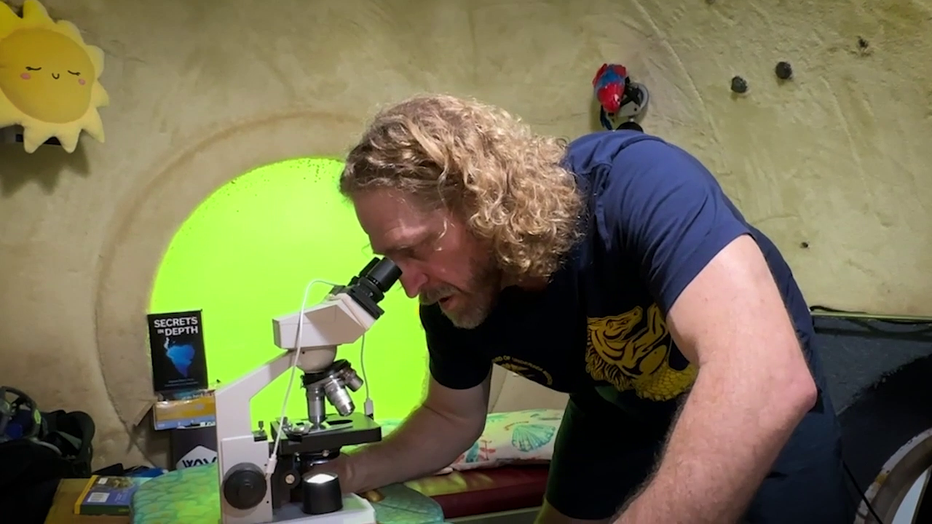
Dr. Joe Dituri, a USF professor and retired Navy commander, has been below the surface monitoring how his body changes under sustained pressure.
He does have a tiny bathroom like you'd see in a boat or an RV, a shower, and a fold-down bed. His main living area is about 20' long and about 5' wide, just enough to turn around in, totaling about 100 square feet.
RELATED: USF professor breaks record for living underwater for 75 days straight — but is aiming for 100 total
Built 50 years ago in Puerto Rico, it was brought to South Florida in the early 80s then set up in Key Largo for tourists to spend a night underwater. Once he's done with the study, it will re-open to divers who want the experience of spending a night underwater.
Previous: USF professor breaks world record for living underwater
A USF professor studying the body’s response to long-term pressure is spending 100 days at an underwater lodge in Key Largo while teaching online.
Dr. Dituri saw it as the perfect petri dish for him to monitor his body changes under pressure. He broke the world record for spending 73 days underwater on May 14, but wanted to stay an even 100 days through June 9.
He wears a portable EKG monitoring his heart and is already seeing benefits of the pressure on his body. His cholesterol is down, and he's noticed decreases in every inflammatory marker in his body by at least a half.

Dr. Joe Dituri has been just below the surface off of Key Largo, and is set to reemerge on June 9.
His body is also producing stem cells. His telomeres, which are the distinctive structures at the end of our chromosomes that should be shortening at this stage in his life, are growing.
It may not be a fountain of youth, but could very well extend one's life span.
"I suspect, and I'll find out exactly how many, but I suspect it will add that many more to my life," Dituri said.
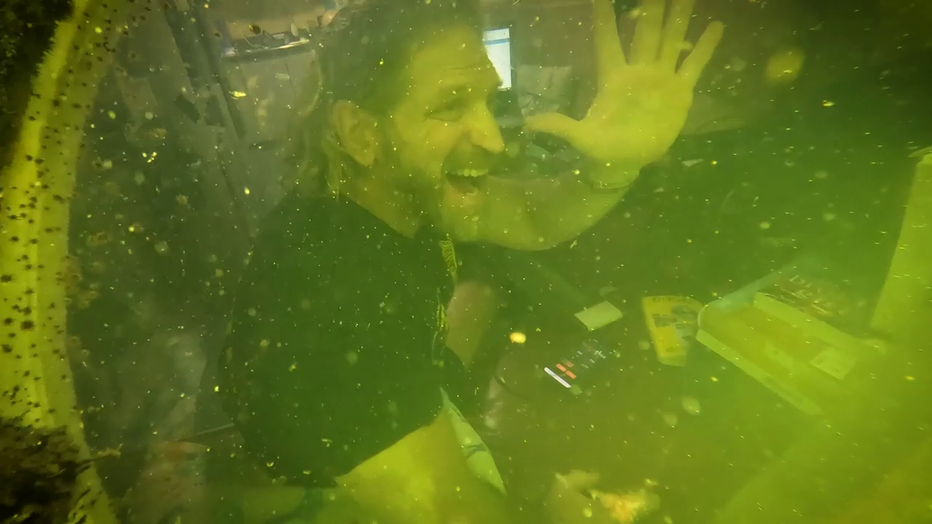
"And that means longevity to your life," FOX 13's Mark Wilson asked.
"Yes, that's exactly what it is, you're adding length, longevity," Dituri said. "Now, it doesn't mean it will extend everyone's life. You've still got to eat well, exercise regularly, and drink lots of water – at least a gallon a day."
Much of it already validating what Dituri expected. After a 28-year career in the Navy, diving and designing submersibles, he retired as a commander and Special Operations diver specializing in hyperbaric research and application.
PREVIOUS: USF researcher plans to live underwater for 100 days to study body's response to extreme pressure
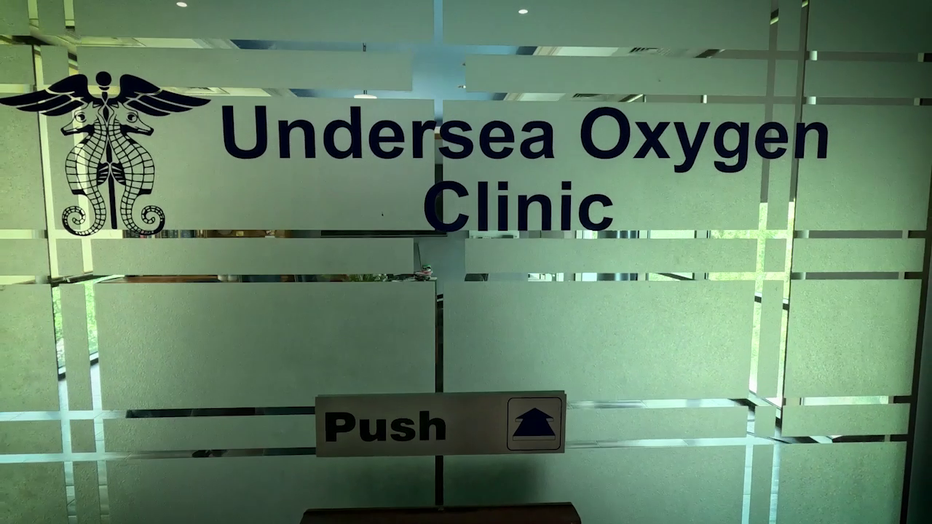
He earned a Ph. D. in biomedical engineering at USF and opened the Undersea Oxygen Clinic in South Tampa - a hyperbaric pressure therapy center to heal concussions and traumatic brain injuries.
But things changed both personally and professionally for him in the fall when he was broad sided at an intersection. A car crash destroyed his classic truck but left him with a traumatic brain injury, turning him from doctor to patient.
He gets emotional recalling how all of a sudden, the suicidal thoughts he'd treated in veterans now filled his head.
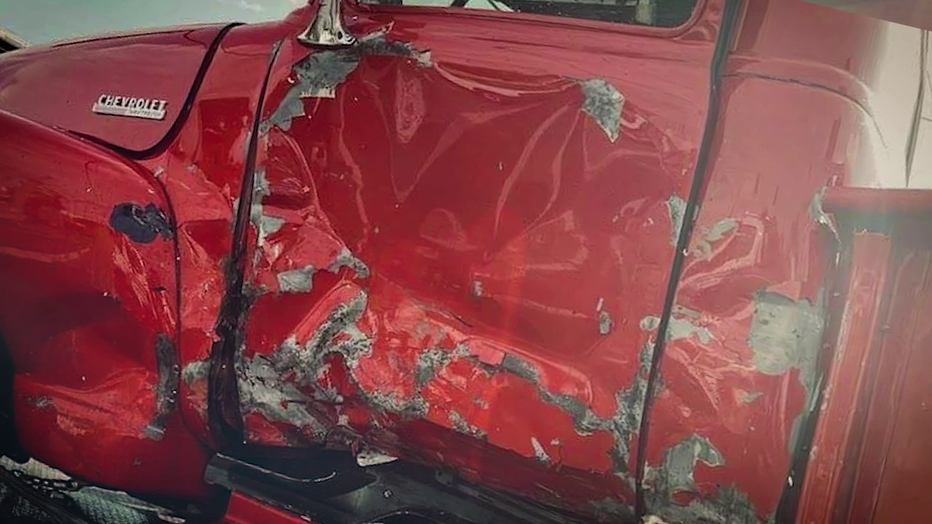
Dituri's classic truck after a crash. The crash left him with a traumatic brain injury.
"I said to myself, 'I'm gonna kill myself if this keeps going,' but I have to be a good Navy guy and do everything that I possibly can," Dituri said.
And the breakthrough came when he surrounded himself with his friends and co-workers offering every resource and option available. They devised a 28-day plan of treatment, and, in about a month, he was a new man.
"It all came out of the international bank of Joe and everybody else who decided to help," he said. "Andre Kerwin, Travis Jennings and Dr. Michael Cross from USF. They all just circled the wagons with me and what we found is if we treat the person with physical, physiological and a psychological perspective simultaneously, you can cure it [traumatic brain injury]," Dituri said passionately.
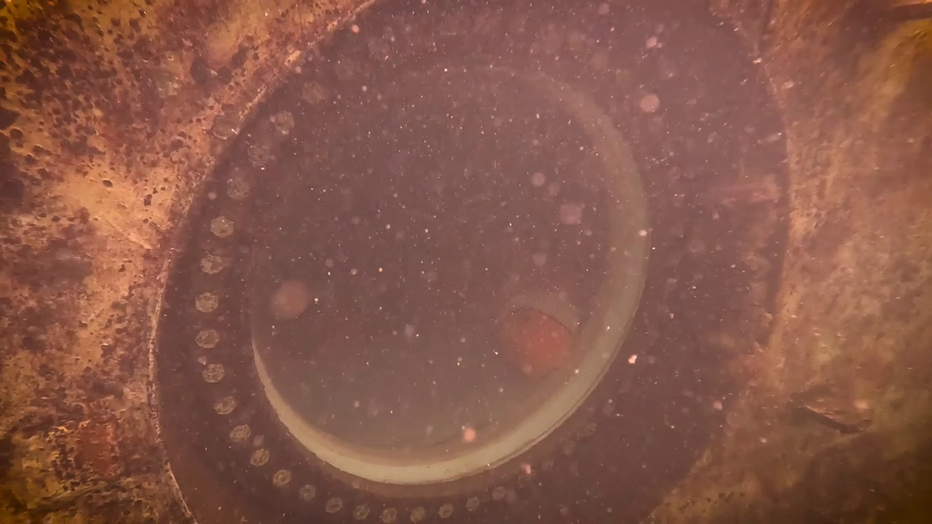
And that's exactly what he's most excited to return to once he emerges June 9. He'll resume work at his Undersea Oxygen Clinic on Westshore Boulevard then his findings this Fall at the "World Extreme Medicine Conference" in Scotland.
But that means giving up his beloved bench seat by the four-inch thick window that's given him a front row seat to the cycle of life for three months.
"It's amazing," Dituri said of being able to see marine life so closely, admitting he'll miss it. His trade-off will be knowing his research is saving lives. "We're fixing people. We're FIXING people," he said with two clenched fists.
To learn more about Dr. Deep Sea's Undersea Oxygen Clinic in Tampa, click here. To get more facts about Hyperbaric Pressure Therapy from the FDA and list of approved treatments, click here.
If you or a loved one is feeling distressed, call the National Suicide Prevention Lifeline. The crisis center provides free and confidential emotional support 24 hours a day, 7 days a week to civilians and veterans. Call the National Suicide Prevention Lifeline at 988 or 1-800-273-8255. Or text HOME to 741-741 (Crisis Text Line).
CLICK HERE for the warning signs and risk factors of suicide. Call 1-800-273-TALK for free and confidential emotional support.

